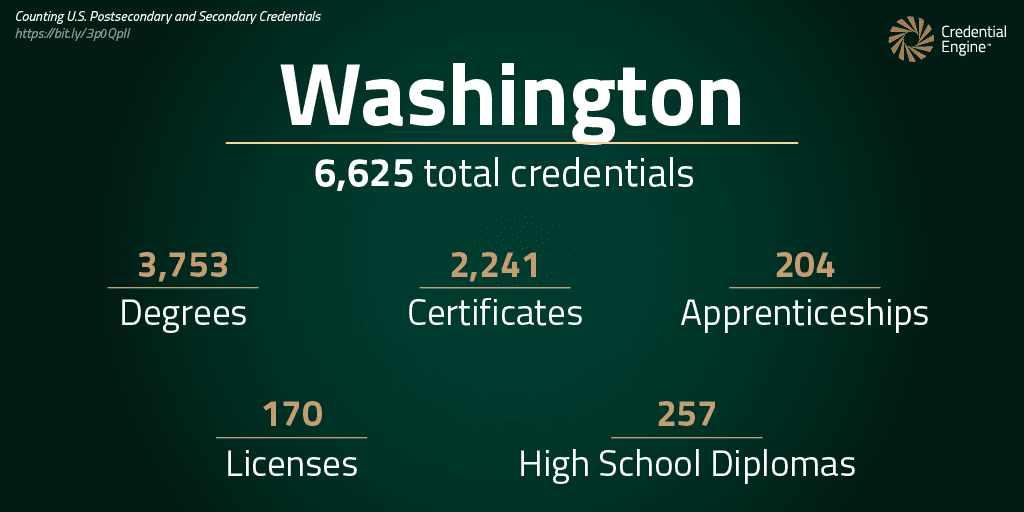
Why We’re Committed
“Students and jobseekers often lack information on the career and earnings potential they can expect from credentials. By partnering with Credential Engine, Washington is able to share the market value of thousands of education credentials and provide a ‘consumer report’ on employment outcomes and earnings. This infrastructure and common language are helping students, jobseekers, and others make well-informed, data-driven decisions about their future.” — Eleni Papadakis, Executive Director, Washington Workforce Training and Education Coordinating Board
About
Washington
Washington was one of Credential Engine’s first state partners because leaders recognized the value of building a Registry where credentials could be broken down into their core competencies and skills and be easily viewed, updated, and compared with one another. The process of pulling apart credentials is critical but difficult work. Washingtonians had already made substantial progress through the state’s public-facing Career Bridge website, which features more than 6,500 credentials including registered apprenticeships, short-term career focused training, one-year certificates, two-year associate’s degrees, bachelor’s degrees, and some master’s degrees. By publishing these credentials to the Credential Registry, Washington will continue to make forward progress in ensuring credential information is more uniform and accessible. This work has never been more important as Washington, like the rest of the U.S., emerges from the COVID-19 pandemic. Washingtonians need a credential system that is transparent, connected, and equitable so they can navigate career paths, learn new skills, and find satisfying, well-paid work. Key to achieving these goals has been making data about postsecondary credentials easier for students and jobseekers to find and use to compare education and training opportunities. Integrating with the Credential Registry and mapping to the Credential Transparency Description Language (CTDL):
- Ensures information about these credentials remains current and available in a common language.
- Allows students and jobseekers to better understand what they can expect to learn, along with the market value associated with the skills and competencies within each credential.
- Helps Washington’s education providers fine-tune their offerings so they hit the mark for what students actually need to learn to fill specific skill sets sought by business and industry.
The Credential Transparency Advisory Committee: Shaping Statewide Vision
In 2019, leaders in Washington formed the state’s first-ever Credential Transparency Advisory Committee to help shape a statewide vision for increasing credential transparency and navigability among Washington’s secondary and postsecondary systems. Committee members include a state legislator and representatives from all sectors of higher education, registered apprenticeships, the Office of the Superintendent of Public Instruction, and the Office of the Governor. The committee has developed recommendations to take to scale promising practices that support the educational, career, and economic momentum of all Washingtonians. In drafting these recommendations, committee members considered success indicators such as:
- Reducing the educational and economic disparities of marginalized populations and communities.
- Eliminating the skills mismatch experienced by employers across almost all sectors.
Washington’s workers, students, and employers need reliable, real-time information about the education and training routes that deliver results across a broad range of career pathways. By pressing ahead on credential transparency through a collaborative cross-agency approach, Washington is rebuilding its economy and affording Washingtonians more opportunities. Ongoing efforts to create a common credential taxonomy using CTDL will ensure that timely, trusted information about credentials opens eyes to the full range of opportunities available for learning, advancement, and meaningful careers.
Publishing, Employer Engagement, and Vision for the Future
Publishing via API has enabled Washington’s Workforce Board to integrate the extensive database of postsecondary credentials from Career Bridge to the Credential Registry. Thus far, the Workforce Board has published close to 4,000 credentials from Washington’s community and technical colleges, private career schools, public and private four-year institutions, and apprenticeships. By the end of the summer 2021, all 6,500-plus Career Bridge credentials should be published. About half of the credentials and their accompanying data are independently analyzed by Workforce Board research staff, who publish performance results including completion rates, earnings and employment rates of recent graduates, and the industry where they went to work. Highlighting the “real world” return on investment for thousands of education and training programs enables Washington residents to make data-driven decisions about education and careers in the Evergreen State.
Washington recently became the third state to pass legislation and begin collecting occupational data from employers. Next year, in 2022, employers in Washington will be required to report their employees’ job title as part of their unemployment insurance wage file. This new data point will help policymakers and communities understand who is working, what kind of work they’re doing, and where they’re doing it—filling in labor market gaps and focusing training programs to meet regional needs. Occupational data will also help pinpoint the top careers of recent graduates from thousands of Washington education and training programs, providing an even more robust and granular “consumer report card” for whether an education program/credential led to the career for which students trained. Washington’s efforts toward credential transparency not only ensure that currently available data are accessible but are also exposing opportunities to improve the way that credential information is communicated.
State Partners
Regional Partners
Get in Touch
Our team of experts is ready to help you embark your credential transparency journey. Whether you have questions about our technologies, services, or don’t know how to get started, we’re here to assist.

